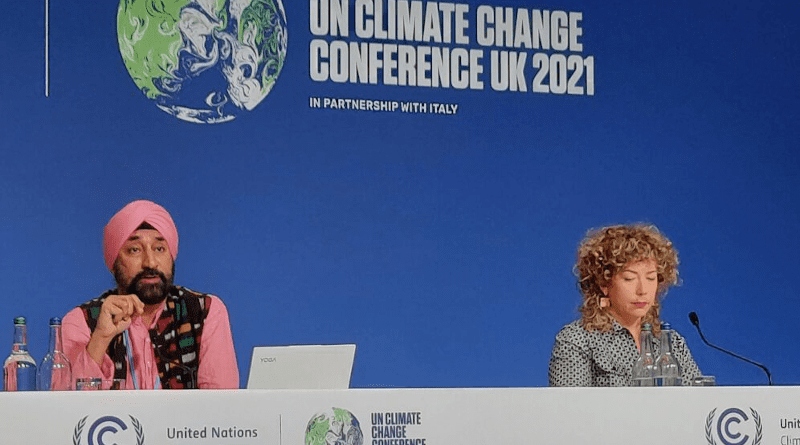COP26: Expectations, Pledges And Actions – OpEd
By Maria Emilia Burgos and Niomi Choksi*
The COP26 summit on climate change ended in Glasgow with calls to show efficiency in battling climate change, meet the emission reduction targets and of course, double the funds to help underdeveloped and developing nations cope with the effects of global warming.
Before it started, the Glasgow summit was dubbed by many as the “last, best hope” to save the planet. The initial days of its progress noted that world leaders and civil societies showed up in force to start the gathering with new climate promises, signaling that ‘COP26’ is moving towards the consensus of ‘The COP 26’
Many like Greta Thunberg with the pessimistic outlook lashed out at the global forum and accused of moving ahead without concrete plans to follow through and consisting of a lot of “blah, blah, blah.
Expectations
The ultimate goal or the prior agenda for the meeting was to ensure that planet earth should not heat more than 1.5 degrees Celsius by 2100. One of the most common measures is to curtail the use of coal as soon as possible. However, this may not sound equal to all parties. For example, a country like India with an energy need for 1.4 billion people appealed to ‘phase down’ the use of coal in upcoming decades rather than Switzerland which suggested to ‘phase out’ the use of coal.
Other expectations included that countries with more developed and emerging economies will reduce their emissions. On the one hand, securing global net-zero by mid-century and keeping 1.5 degrees within reach.
Biodiversity losses as a consequence of deforestation and fires will not be recovered, however, it is possible to create warning systems and resilient infrastructure to restore nature and forest ecosystems.
These all expectations made the talks in Glasgow a test of whether global cooperation is even possible to confront a crisis that does not recognize national borders.
Pledges
- US-China: World’s two biggest polluters announced a joint agreement to cut more emissions in this decade. Beijing came with a plan to reduce another potent greenhouse gas – methane. This was indeed surprising for the delegates to the summit. The agreement was short on specifics and while China agreed to “phase down” coal starting in 2026, it did not specify by how much or over what period.
- Methane: Followed by the US-China agreement, more than 100 countries agreed to cut emissions of methane by 3 percent by the end of this decade. The pledge was part of a drive by the Biden administration, which also announced that the Environmental Protection Agency would limit the methane coming from about one million oil and gas rigs across the United States.
- Deforestation: World leaders, including Bolsonaro, Jinping, Putin and Biden, vowed to end deforestation by 2030. The agreement comprises about 85 percent of the global forests, which are crucial to absorbing CO2 and slowing the pace of global warming. However, many advocacy groups and NGOs have criticized the agreement as inefficient, citing those similar efforts have failed in the past.
- India: South Asian nation has promised to cut its emissions to net-zero by 2070 – missing a key goal of the COP26 summit for countries to commit to reaching that target by 2050. Indian Prime Minister Narendra Modi made the pledge, the first time India has set a net-zero target, at the Glasgow summit
Another set of pledges included
- The Glasgow Leaders Declaration on Forests and Land Use, in which 110 countries aim to end deforestation by 2030.
- The Breakthrough Agenda, launched by the UK and endorsed by 42 States, to accelerate the development and deployment of clean technologies and sustainable solutions.
- The High Ambition Coalition announcing its resolve to deliver on mid-century net-zero greenhouse gas (GHG) emissions goals, including by phasing down unabated coal-fired power plants and halting inefficient fossil fuel subsidies as soon as possible;
- International Just Energy Transition Partnership, in which France, Germany, UK, US, and EU aim to support South Africa’s efforts to decarbonize its economy.
Alongside the leaders’ statements, negotiations launched on finance (both the programme on long-term finance and a new post-2025 finance goal), capacity building, Article 6 (cooperative approaches), loss and damage, common time frames for nationally determined contributions (NDCs), transparency, and adaptation, among other issues.
Actions
The final understanding leaves unresolved the crucial question of how much and how quickly each nation should cut its emissions over the next decade.
Countries from the Western Europe, United States, Japa and Canada account for only 12 percent of the global population today but are responsible for 50 percent of all the planet-warming greenhouse gases released from fossil fuels and industry over the past 170 years.
US President Biden and European leaders have insisted that developing countries like India, Indonesia and South Africa need to accelerate their shift away from coal power and other fossil fuels. But those countries counter that they lack the financial resources to do so, and those rich countries have been stingy with aid.
The new deal will not, on its own, solve global warming, despite the urgent demands of many of the thousands of politicians and activists gathered at the climate summit here. It leaves unresolved the crucial question of how much and how quickly each nation should cut its emissions over the next decade. And it still leaves many developing countries far short of the funds they need to build cleaner energy and cope with increasingly extreme weather disasters.
Also, there was a clear gender and generation gap at the Glasgow talks. Those with the power to make decisions about how much the world warms in the coming decades are mostly old and male. Those who are angriest about the pace of climate action are mostly young and female.
*Maria Emilia Burgos is the Program Manager for SDGs at The Kootneeti. Niomi Choksi is a Researcher at The Kootneeti

